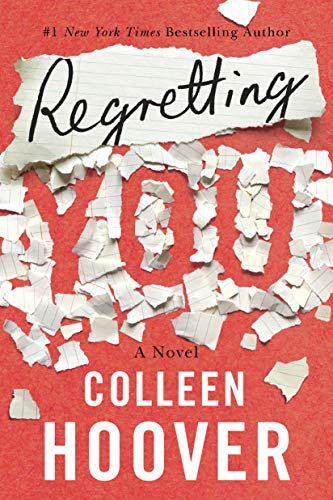

From #1 New York Times bestselling author of It Ends with Us comes a poignant novel about family, first love, grief, and betrayal that will touch the hearts of both mothers and daughters.
Morgan Grant and her sixteen-year-old daughter, Clara, would like nothing more than to be nothing alike.
Morgan is determined to prevent her daughter from making the same mistakes she did. By getting pregnant and married way too young, Morgan put her own dreams on hold. Clara doesn’t want to follow in her mother’s footsteps. Her predictable mother doesn’t have a spontaneous bone in her body.
With warring personalities and conflicting goals, Morgan and Clara find it increasingly difficult to coexist. The only person who can bring peace to the household is Chris—Morgan’s husband, Clara’s father, and the family anchor. But that peace is shattered when Chris is involved in a tragic and questionable accident. The heartbreaking and long-lasting consequences will reach far beyond just Morgan and Clara.
While struggling to rebuild everything that crashed around them, Morgan finds comfort in the last person she expects to, and Clara turns to the one boy she’s been forbidden to see. With each passing day, new secrets, resentment, and misunderstandings make mother and daughter fall further apart. So far apart, it might be impossible for them to ever fall back together.
Regretting You
With REGRETTING YOU, Colleen Hoover imparts a poignant glimpse into a tumultuous relationship between mother and daughter.
We first meet Morgan as a teen, as she’s swept up in a storm of insecurity and bad decisions. Fast forward sixteen years, and Morgan fears her daughter Clara is headed down the same path.
Clara wants to be nothing like her predictable mother, and instead flocks to her Dad, Chris, and the free-spirited Aunt Jenny. But when tragedy strikes, everything upends for both Morgan and Clara—a situation which exacerbates their worsening relationship.
Worse yet, what happened to Chris brings up questions difficult—and painful—to answer, plunging Morgan into a dark, deep place.
As the storm in their lives wreaks havoc, Morgan’s past barrels back to the present, offering her both a lifeline and clues which shed light to what’s transpired.
Meanwhile, Clara spirals into teenage rebellion, anchoring herself to a boy she’s been forbidden to see.
Before too long, everything will come to a head for both mother and daughter, as secrets and resentments come to light.
As always, Hoover’s storytelling shines with well-drawn characters and an immersive, fluent narrative. Emotions and tensions run high, as a steady beat of longing thrums throughout. Longing for a life fully owned. Longing for those who aren’t there. Longing for love lost and love desperately needed.
The pathos of the story is deeply felt, making it impossible not to devour in a single sitting.
Brimming with emotions raw and real, this is another Colleen Hoover must read.

Miller ends the call just as I’m pulling into his driveway. It’s the first time I’ve ever seen his house. I’ve known whereabouts he lived, but I’ve never actually laid eyes on the home due to rows of trees that line the driveway, hiding what lies beyond the white gravel.
It’s not what I expected.
It’s an older house, very small, wood framed and in severe need of a paint job. The front porch holds the quintessential swing and two rocking chairs, which are the only things about this place that hold appeal.
There’s an old blue truck in the driveway and another car—not as old but somehow in worse shape than the house—that sits to the right of the house on cinder blocks, weeds grown up the sides of it, swallowing the frame.
I’m kind of taken aback by it. I don’t know why. I guess I just imagined he lived in some grandiose home with a backyard pond and a four-car garage. People at our school can be harsh and seem to judge a person’s popularity on the combination of looks and money, but 26
maybe Miller’s personality makes up for his lack of money because he seems popular. I’ve never known anyone to talk negatively about him.
“Not what you were expecting?”
His words jar me. I put the car in park when I reach the end of the driveway and do my best at pretending nothing about his home shocks me. I change the subject entirely, looking at him with narrowed eyes.
“Some dude?” I ask, circling back to how he referred to me on his phone call.
“I’m not telling my girlfriend I caught a ride with you,” he says. “It’ll turn into a three-hour interrogation.”
“Sounds like a fun and healthy relationship.”
“It is, when I’m not being interrogated.”
“If you hate being interrogated so much, maybe you shouldn’t be tampering with the city limit.”
He’s out of the car when I say that, but he leans down to look at me before he closes the door. “I won’t mention you were an accomplice if you promise not to mention I’m adjusting the city limit.”
“Buy me new flip-flops, and I’ll forget today even happened.”
He grins as if I amuse him, then says, “My wallet is inside. Follow me.”
I was only kidding, and based on the condition of the home he lives in, I’m not about to take cash from him. But it seems like we somehow developed this sarcastic rapport, so if I suddenly become sympathetic and refuse his money, I feel it might be insulting. I don’t mind insulting him in jest, but I don’t want to actually insult him. Besides, I can’t protest because he’s already walking toward his house.27
I leave my flip-flops in the car, not wanting to track tar into his house, and follow him barefooted up the creaky steps, noticing the rotting wood on the second step. I skip over that step.
He notices.
When we walk into the living room, Miller discards his tarred shoes by the front door. I’m relieved to see the inside of the home fares better than the outside. It’s clean and organized, but the decor is ruthlessly trapped in the sixties. The furniture is older. An orange felt couch with your standard homemade afghan flanking the back of it faces one wall. Two green, extremely uncomfortable looking chairs face the other. They look midcentury, but not in a modern way. Quite the opposite, actually. I have a feeling this furniture hasn’t been changed out since it was purchased, long before Miller was even born.
The only thing that looks fairly new is a recliner facing the television, but its occupant looks older than the furniture. I can only see a portion of his profile and the top of his balding, wrinkled head, but what little hair he does have is a shiny silver. He’s snoring.
It’s hot inside. Almost hotter than it is outside. The air I’m gently sucking in is warm and smells of bacon grease. The living room window is raised, flanked by two oscillating fans pointed at the man. Miller’s grandfather, probably. He looks too old to be his father.
Miller passes through the living room and heads toward a hallway. It begins to weigh on me, the fact that I’m following him to take his money. It was only a joke. Now it feels like an extremely pathetic show of my character.
When we reach his bedroom, he pushes open the door, but I remain in the hallway. I feel a breeze sweep through 28
his room and reach me. It lifts the hair from my shoulder, and even though the breeze is warm, I find relief in it.
My eyes scroll around Miller’s room. Again, it is not reminiscent of the condition of the outside of his home. There’s a bed, full-size, flush against the far wall. He sleeps there. Right there, in that bed, tousling about in those white sheets at night. I force myself to look away from the bed, up at a huge poster of the Beatles hanging where a headboard would normally be. I wonder if Miller is a fan of older music, or if the poster has been here since the sixties, much like the living room furniture. The house is so old I wouldn’t doubt it if this was his grandfather’s room as a teenager.
But what really catches my eye is the camera on his dresser. It’s not a cheap camera. And there are several different-size lenses next to it. It’s a setup that would make an amateur photographer blush. “You like photography?”
He follows my line of sight to the camera. “I do.” He pulls open the top drawer of his dresser. “But my passion is film. I want to be a director.” He glances at me. “I’d kill to go to UT, but I doubt I can get a scholarship. So community college it is.”
I thought he was making fun of me in the car, but now that I’m looking around his room, it’s sinking in that he really might have been telling me the truth. There’s a stack of books next to his bed. One of them is by Sidney Lumet called Making Movies. I walk over and pick it up, flipping through it.
“You’re really nosy,” he mimics.
I roll my eyes and set the book down. “Does the community college even have a film department?”
He shakes his head. “No. But it could be a stepping-stone to somewhere that does.” He walks closer to me, 29
holding a ten-dollar bill between his fingers. “Those shoes are five bucks at Walmart. Go crazy.”
I hesitate, no longer wanting to take the money from him. He sees my hesitation. It makes him sigh, frustrated; then he rolls his eyes and shoves the bill in the front left pocket of my jeans. “The house is shit, but I’m not broke. Take the money.”
I swallow hard.
He just stuck his fingers in my pocket. And I can still feel them, even though they’re no longer there.
I clear my throat and force a smile. “Pleasure doing business with you.”
He tilts his head. “Was it? Because you look hella guilty for taking my money.”
I’m usually a better actress than this. I’m disappointing myself.
I walk toward his doorway, even though I’d love a better look at his bedroom. “No guilt here. You ruined my shoes. You owed me.” I back out of his room and begin to walk down the hallway, not expecting him to follow me, but he does. When I reach the living room, I pause. The old man is no longer in the recliner. He’s in the kitchen, standing next to the refrigerator, twisting the lid off a water bottle. He eyes me with curiosity as he takes a sip.
Miller sidesteps around me. “You take your meds, Gramps?”
He calls him Gramps. It’s kind of adorable.
Gramps looks at Miller with a roll of his eyes. “I’ve taken ’em every damn day since your grandma skipped town. I’m not an invalid.”
“Yet,” Miller quips. “And Grandma didn’t skip town. She died of a heart attack.”
“Either way, she left me.”30
Miller looks at me over his shoulder and winks. I’m not sure what the wink is for. Maybe to ease the fact that Gramps seems a little like Mr. Nebbercracker, and Miller is assuring me that he’s harmless. I’m beginning to think this is where Miller gets his sarcasm from.
“You’re a nag,” Gramps mutters. “Twenty bucks says I outlive you and your entire generation of Darwin Award recipients.”
Miller laughs. “Careful, Gramps. Your mean side is showing.”
Gramps eyes me for a moment, then looks back at Miller. “Careful, Miller. Your infidelity is showing.”
Miller laughs at that jab, but I’m kind of embarrassed by it. “Careful, Gramps. Your varicose veins are showing.”
Gramps tosses the water bottle lid and hits Miller square in the cheek with it. “I’m rescinding your inheritance in my will.”
“Go ahead. You always say the only thing you have worth any value is air.”
Gramps shrugs. “Air you won’t be inheriting now.”
I finally laugh. I wasn’t positive their banter was friendly before the lid toss.
Miller picks up the lid and fists it in his palm. He motions toward me. “This is Clara Grant. She’s a friend of mine from school.”
A friend? Okay. I give Gramps a small wave. “Nice to meet you.”
Gramps tilts his head down a little, looking at me very seriously. “Clara Grant?”
I nod.
“When Miller was six years old, he shit his pants at the grocery store because the automatic flusher on public toilets terrified him.”
Miller groans and opens the front door, looking at me. “I should have known better than to bring you inside.” He motions for me to head outside, but I don’t.
“I don’t know if I’m ready to leave,” I say, laughing. “I kind of want to hear more stories from Gramps.”
“I’ve got plenty,” Gramps says. “In fact, you’ll probably love this one. I have a video from when he was fifteen and we were at the school—”
“Gramps!” Miller snaps, quickly cutting him off. “Take a nap. It’s been five minutes since your last one.” Miller grabs my wrist and pulls me out of the house, closing the door behind him.
“Wait. What happened when you were fifteen?” I’m hoping he finishes that story, because I need to know.
Miller shakes his head and actually seems a little embarrassed. “Nothing. He makes up shit.”
I grin. “No, I think you’re the one making up shit. I need that story.”
Miller puts a hand on my shoulder and urges me toward the porch steps. “You’re never getting it. Ever.”
“You aren’t aware of my persistence. And I like your grandpa. I might start visiting him,” I tease. “Once the city limit is moved, I’ll order a pepperoni-and-pineapple pizza and listen to your gramps tell embarrassing stories about you.”
“Pineapple? On pizza?” Miller shakes his head in mock disappointment. “You aren’t welcome here anymore.”
I walk down the steps, skipping the rotted one again. When I’m safe on the grass, I turn around. “You can’t dictate who I get to be friends with. And pineapple on pizza is delicious. It’s the perfect combination of sweet and salty.” I pull out my phone. “Does your gramps have Instagram?”
Miller rolls his eyes, but he’s smiling. “See you at school, Clara. Don’t ever come back to my house again.”
I’m laughing as I walk back to my car. When I open the car door and turn around, Miller is looking down at his phone. He never once looks back at me. When he disappears inside his house, an Instagram notification pings through on my phone.
Miller Adams started following you.
I smile.
Maybe it’s all been in my head.
Before I’m even out of the driveway, I’m dialing Aunt Jenny.
















 by
by